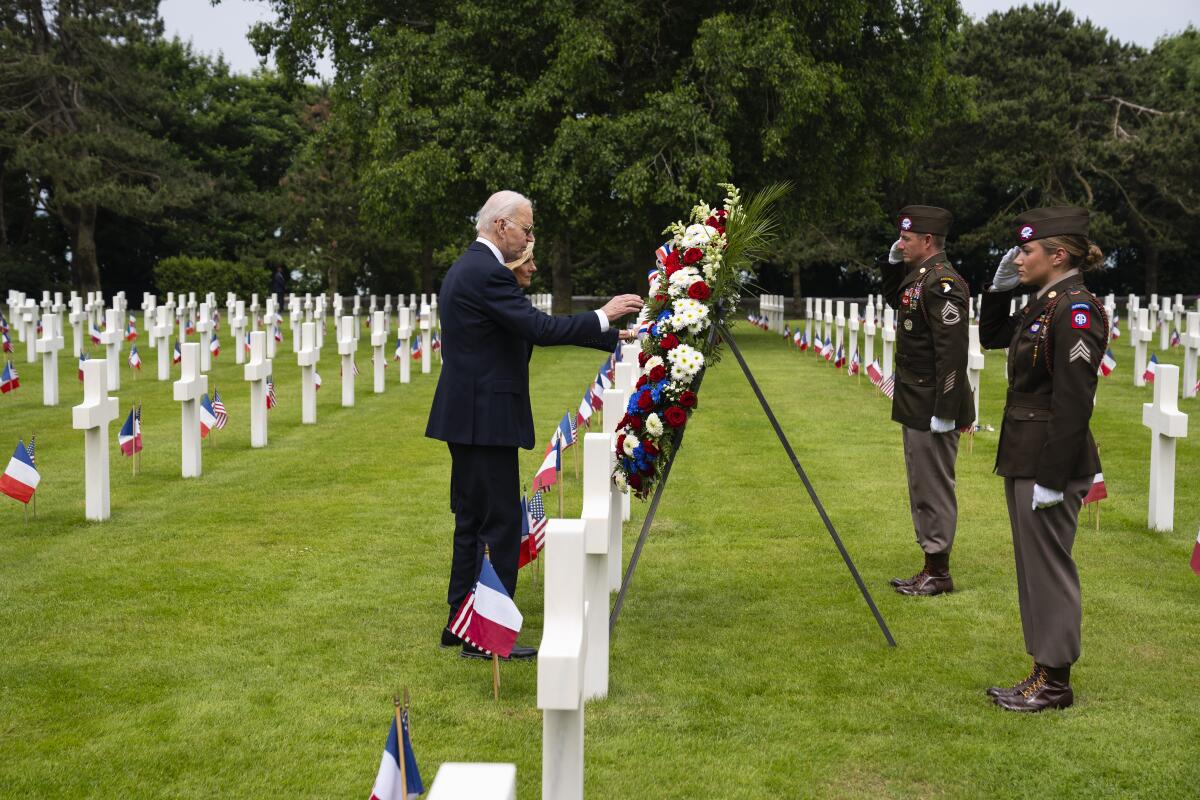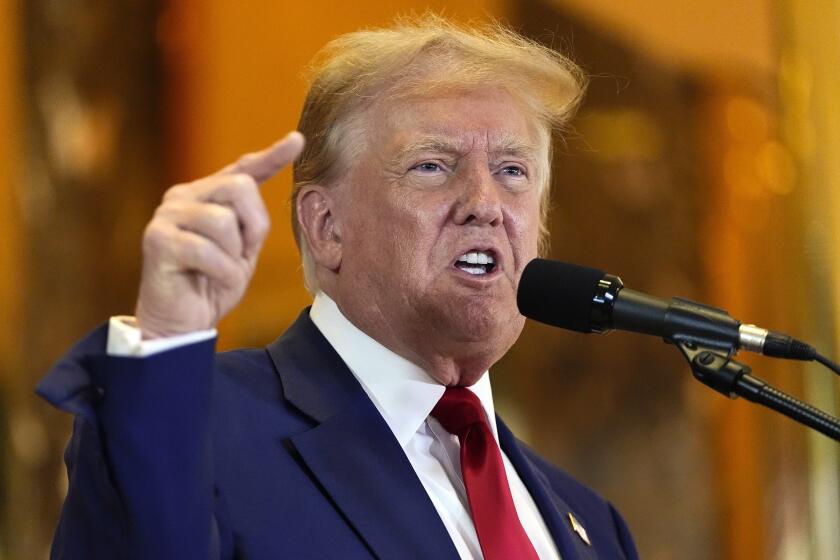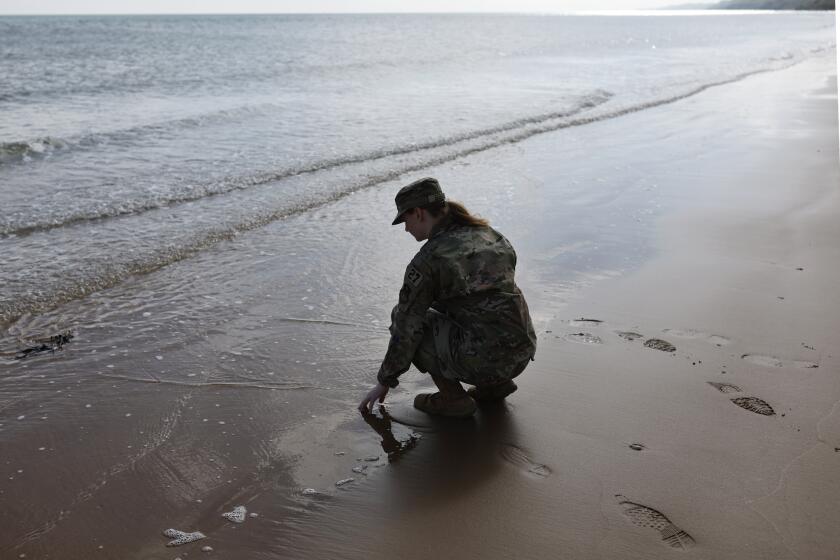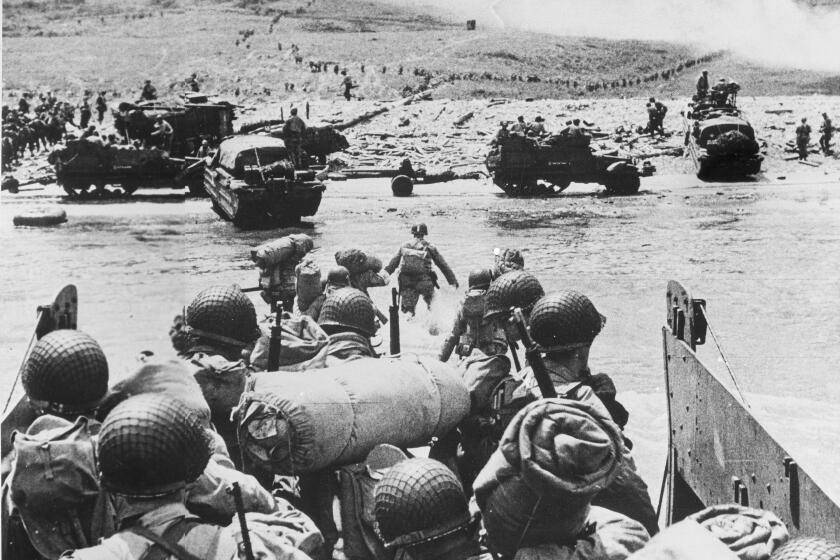Biden’s disquieting D-day message — democracy has to be saved all over again

- Share via
When I traveled with U.S. presidents on foreign trips, I’d have days when I couldn’t believe I was actually getting paid for the experience. One of those was June 6, 2004. President George W. Bush was in Colleville-sur-Mer on the French coast in Normandy, to commemorate the 60th anniversary of the D-day landing.
The ceremony under a sunny, azure sky was moving enough (and I sat behind Steven Spielberg and Tom Hanks, of “Saving Private Ryan” fame). Better yet was my walk later among rows of austere white crosses and a few Stars of David in the Normandy American Cemetery. I was alone but for a few Englishmen. One clutched a clipboard and seemed to direct the others to certain graves. I watched them, then interrupted.
Opinion Columnist
Jackie Calmes
Jackie Calmes brings a critical eye to the national political scene. She has decades of experience covering the White House and Congress.
Turns out the elderly men were from a town where U.S. servicemen had stayed in 1944 while awaiting orders to cross the English Channel. They had a list of names and grave numbers for those long-ago American visitors who were now buried in this place. At each grave, they left a cross, 7-by-4 inches, with a red paper poppy affixed above the word “REMEMBRANCE.” They gave me one, which for 20 years has had a place of honor in my home. When I dust it, I do so reverently.
That small token holds outsize symbolism, both of an America that is great — its citizens willing to sacrifice to preserve democracy against tyranny for themselves as well as foreigners — and of our allies’ gratitude. In that spirit, but with a disquieting difference, I watched the coverage of President Biden’s visit to Normandy to mark the 80th anniversary of D-day.
It’s sad and scary that so many people can believe anything from Donald Trump’s mouth when he contends his felony conviction marked the ‘darkest day in American history.’
Two decades ago, few if any of us listened to the tributes with any thought that the democracies represented there, or their alliances born of World War II, were at all endangered. Yet now both seem nearly as fragile as the 180 veterans who assembled at the cemetery, mostly in wheelchairs, bent and blanketed. The surviving “boys of Pointe du Hoc” and other Normandy operations are now centenarians.
At the next decennial commemoration, those last living links to the liberation of Europe from Nazism and fascism will surely be gone. But what of the countries and the cause they fought for? The challenge for the rest of us is to ensure they live on.
That challenge was Biden’s theme in his 16-minute speech at Colleville on Thursday. What the United States and its allies did 80 years ago, he said, “was a powerful illustration of how alliances, real alliances, make us stronger — a lesson that I pray we Americans never forget.”
Across Normandy, France, Allied veterans of World War II are the VIPs of D-day 80th anniversary celebrations this week
The fact that Biden even added that line about forgetting was a tell about his insecurity, and ours. The president, who was a baby on D-day but for the past half-century has been an actor in U.S. foreign policy debates, knows better than anyone the unsettling rightward shift in domestic and global politics of late, and the threats that fester. When he reiterated his message Friday at Pointe du Hoc, the echoes of Ronald Reagan’s famous speech there 40 years ago put Biden closer to Reagan’s internationalist vision than Reagan’s own party is.
In Biden’s first State of the Union address two years ago, just six days after Russia invaded Ukraine, a U.S. and European ally, he was more confident: “In the battle between democracy and autocracies, democracies are rising to the moment.” Yet he has barely been able to sustain the once-strong U.S. military commitment to the 50-nation coalition backing Ukraine. He faces a growing “America First” isolationism among Republicans in Congress, who take their orders from Donald Trump. And he could well be defeated in November by the former president.
World War II veterans are in Normandy this week to mark 80 years since the D-day landings that helped lead to Hitler’s defeat. They’re sharing their memories.
Biden’s international audience at the American cemetery Thursday plainly shared the uncertainty about the free world, and about the U.S. willingness to continue to lead it.
There was a burst of applause, where in past years there might well have been none, when Biden recounted that after the war the allies established NATO. The clapping seemed to surprise him; it shouldn’t have. The subtext: His listeners fear that if Trump is elected again, he’ll make good on past threats to weaken or abandon NATO and to encourage the Russians to do “whatever they hell they want.”
“Isolationism was not the answer 80 years ago, and it is not the answer today,” Biden said to more applause. The test case is Ukraine: “We will not walk away,” he said. Applause again. Yet Biden has said that before, and he was nearly proved wrong.
The June 6, 1944, D-day invasion of Nazi-occupied France punched a hole in Adolf Hitler’s defenses in Western Europe, changing the course of World War II.
The president’s audience was as much the one at home as the one before him on the cemetery’s green expanse: “Let us be the generation that when history is written about our time — in 10, 20, 30, 50, 80 years from now — it will be said: When the moment came, we met the moment. … Our alliances were made stronger. And we saved democracy in our time as well.”
The choice has never been clearer: Biden seeks reelection against a rival who’s made a movement of “Make America Great Again,” which amounts to authoritarianism at home and a go-it-alone, dictator-friendly approach abroad. Trump has none of my reverence — or yours — for America’s history of sacrifice and leadership abroad. As president, he canceled a visit to an American World War I cemetery in France, grousing to advisors, “It’s filled with losers.”
That would appall the Brits I met at Colleville 20 years ago, who’d crossed the Channel to honor the Americans who did the same and died on foreign soil. Now it’s up to us to do our small part to salute past generations’ sacrifices, and save democracy.
More to Read
A cure for the common opinion
Get thought-provoking perspectives with our weekly newsletter.
You may occasionally receive promotional content from the Los Angeles Times.












